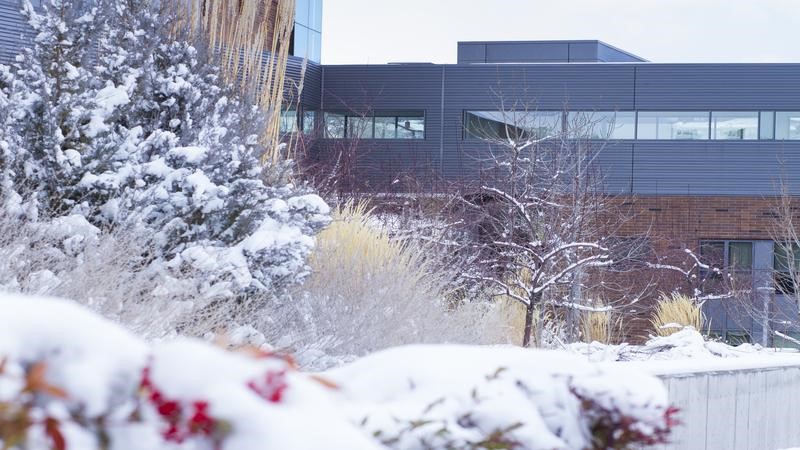University General Course Catalog 2024-2025 ARCHIVED CATALOG: LINKS AND CONTENT ARE OUT OF DATE. CHECK WITH YOUR ADVISOR.
University of Nevada School of Medicine
|
|

Paul J. Hauptman, M.D., Dean
Pennington Building, Second Floor
(775) 784-6001
Department of Admissions and Student Affairs
Office of Admissions and Student Affairs
(775) 784-6063
Office of Recruitment and Student Affairs
(702) 671-6457
The University of Nevada School of Medicine is a community-based medical school which means the school uses existing clinical facilities in its clinical training programs; it owns no teaching hospital.
The School of Medicine is comprised of five basic science and sixteen clinical science teaching departments. Interaction among the disciplines provides students with a well-balanced approach to health care education.
The School of Medicine provides a range of baccalaureate, graduate, and professional degree programs.
Baccalaureate Degree Programs
The School of Medicine offers a bachelor of science degree with a major in speech pathology. The clinical training and practicum associated with these fields are fully integrated with the school’s curriculum. Students earn their baccalaureate degrees by completing the following requirements:
- A total of 120 credits in required and elective courses. Of the 120 credits, a maximum of eight credits of combined courses in recreation and physical education and military science (below 300-level) may apply;
- A minimum of 40 credits in courses numbered 300 or above;
- The university Core Curriculum requirements;
- The general university requirements regarding grade-point average and resident credit.
The number of credits taken on an satisfactory/unsatisfactory (S/U) basis may not exceed 30. These courses may not be taken to fulfill degree or core curriculum requirements.
Biochemistry
Howard Medical Sciences
(775) 784-6031
Undergraduate Curriculum
An undergraduate major emphasizing biochemistry and molecular biology is offered by the Department of Biochemistry and administered through the College of Biotechnology and Natural Resources (refer to the College of Biotechnology and Natural Resources section in this catalog). The program provides the student with a well-rounded general education emphasizing the biological and chemical sciences. It provides specific training in the major field through a sequence of biochemistry and molecular biology courses taken primarily during the student’s junior and senior years. A minor in biochemistry is also available.
The bachelor of science degree with a major in biochemistry prepares students for graduate study, civil service positions, and work in industrial and professional fields related to life, agricultural and medical sciences. Active areas of research for department faculty include: the molecular biology, biochemistry and physiology of plants; the molecular biology, biochemistry and physiology of insects; cancer therapeutics; and structural biology. Students with a specific interest in any of these areas should contact the department as early as possible for advisement.
Speech Pathology and Audiology
103 Nell J. Redfield Building
(775) 784-4887
The bachelor of science degree with a major in speech pathology is the preprofessional program. A master’s degree is essential for professional competence in the field, and it is a requirement for state licensure and the Certificate of Clinical Competence by the American Speech Language-Hearing Association (ASHA-CCC).
In the bachelor’s degree program, students must complete a minimum of 38 credits in speech pathology and audiology, and 25 clock hours of supervised observation with individuals who display a variety of communicative disorders.
All speech pathology and audiology majors are required to have their programs approved by a faculty advisor within the department.
Cell and Molecular Biology Major
Cell and molecular biology is an interdisciplinary program offered by the School of Medicine and the College of Agriculture Biotechnology and Natural Resources. Study programs lead to the master of science or doctor of philosophy degree. Additionally, medical students may earn a Ph.D. degree through the program.
For specific program information, refer to the Interdisciplinary section of this catalog.
Cellular and Molecular Pharmacology and Physiology Major
Cellular and molecular pharmacology and physiology is an interdisciplinary graduate program. The program leads to a doctor of philosophy degree.
For specific program information, refer to the Interdisciplinary section of this catalog.
Master of Physician Assistant Studies
Office of Admissions and Recruitment
(775) 784-4843
paprogram@med.unr.edu
https://med.unr.edu/physician-assistant
The University of Nevada, Reno School of Medicine (UNR Med) Master of Physician Assistant Studies program is a full-time, 25-month, 7-semester, academic terminal professional practice degree that includes 13 months of medical science, clinical coursework, and clinical skills training followed by 12 months of preceptor-supervised clinical training. This program will prepare students for a career as a physician assistant in order to increase access to health care in Nevada. The purpose of this program is to increase the number of providers in the Nevada primary care workforce who are trained specifically to satisfy health care shortages and to function effectively in health care teams.
Four-Year Medical School Program
The University of Nevada School of Medicine admits 70 students each year, many of whom are Nevada residents. The first two years of the curriculum - the basic science years - are taught at the Reno campus. The third and fourth years - the clinical years - are spent in hospitals and clinics throughout the state. The medical school gives students the opportunity to work on research projects, interact with patients, work directly with physicians, and experience the excitement of becoming a physician.
The School of Medicine is one of a growing number of medical schools across the country to begin clinical training in the first two years of medical education. First and second year students experience preceptorships with community-based primary care physicians. This unique opportunity allows students to experience how “real” medicine is practiced early in medical school.
Additionally, the University of Nevada School of Medicine is the home for the:
|